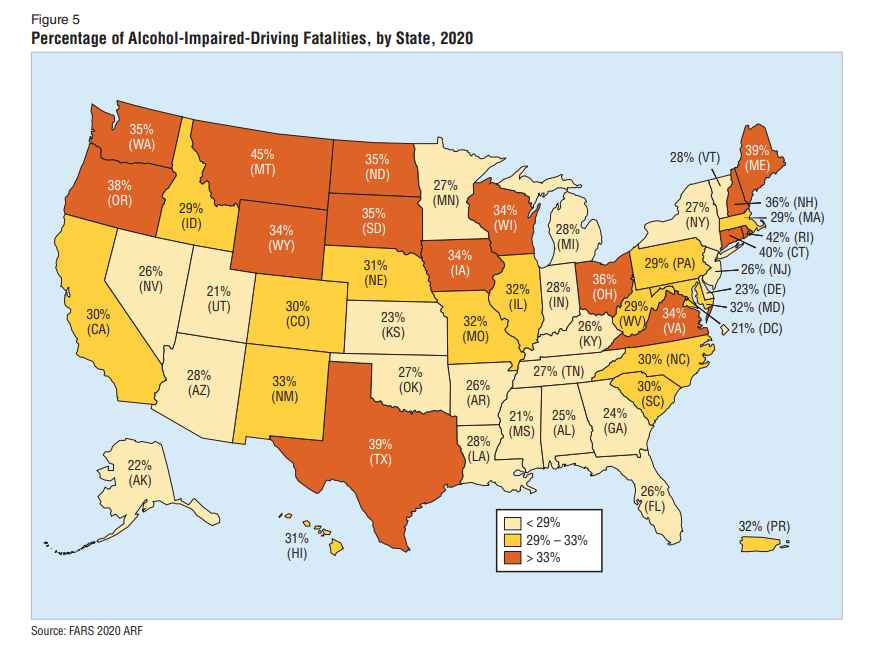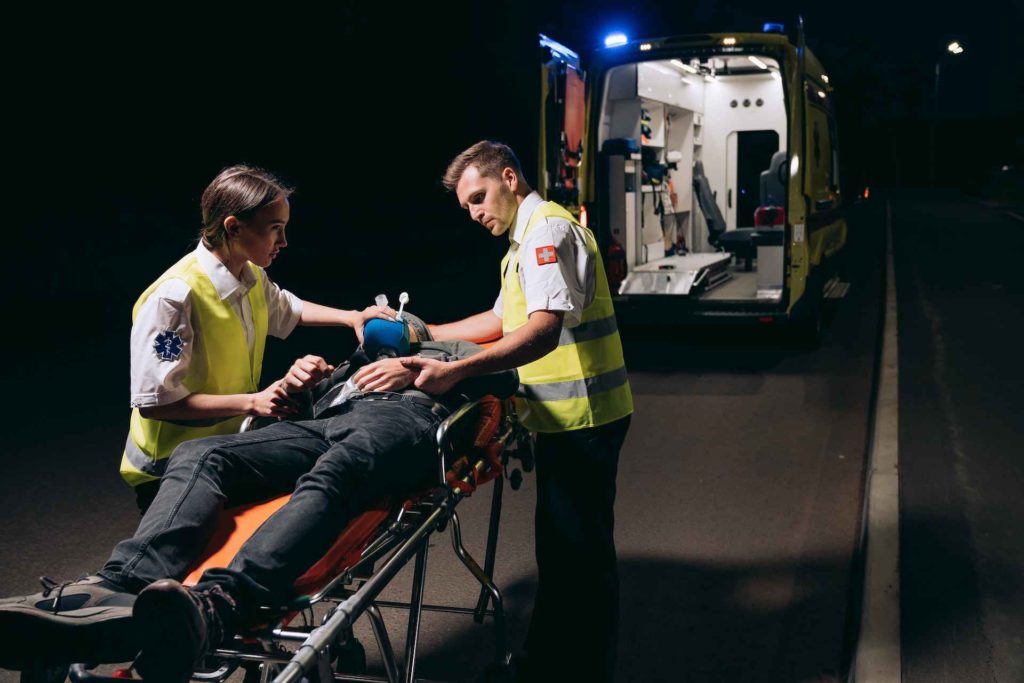Texas roads are notorious for being highly congested. The state of Texas logged 23.42 hours of traffic congestion and ranked 16th in the 26th Annual Highway Report.
Travelers passing through Austin, TX, on the I-35 can confirm the findings. That stretch is among the busiest in the state, according to the Texas A&M Transportation Institute study. Most vehicles that pass through and cause traffic jams are trucks, which can exacerbate the situation.
Traffic congestion can have economic consequences, mainly because of the delays it causes motorists. However, it also results in car accidents. While traffic congestion doesn’t necessarily result in high-speed car crash incidents that lead to fatalities, it’s still a contributing factor in accidents.
For example, a drunk driver may side-sweep other vehicles. Driver frustration can also lead to road rage, causing them to ignore road signs at intersections.
In case of a car crash resulting in serious injuries, car accident victims should know their entitlement to an injury claim. They can check out legal resources online to find out their rights. If you are considering a lawsuit, connect with a personal injury attorney to get proper compensation.
Get help from a reliable law firm.
Leading Causes of Car Accidents in Austin, TX

Car wrecks are devastating. They can damage your vehicle and carry serious consequences for you as well. You may be responsible for injuries and even death if you’re involved in a car accident with another vehicle.
Texas is an at-fault state, meaning the person accountable for the accident must shoulder all the resulting costs. Injured car accident victims can file a personal injury lawsuit or car
However, car accident cases are always tricky. Sometimes, there are more than one or two parties involved. It is best to work with an experienced personal injury attorney. Car accidents often occur due to a mixture of circumstances and reckless behavior. Knowing the cause of the car accident can help shape the process of proving liability.
Here are some leading causes of car accidents in Austin, TX.
Speeding
Most states limit how fast you can drive on public roads. The Texas Department of Transportation has set a maximum speed limit of 70 mph on state roads. However, the Texas Transportation Commission allows an increase up to 85 mph if a highway can accommodate it.
If you’re going faster than what’s allowed by law, it increases your risk of getting into an accident. Overspeeding is a critical factor in many vehicle crashes and fatalities. The faster you go, the longer it takes your vehicle to stop. This results in a greater risk of a road crash.
It’s critical to note that speed and stopping distance don’t increase proportionately. Even a slight increase in vehicle speed can result in a considerable increase in stopping distances.
In a vehicular collision, the speeding driver becomes liable for serious injuries or losses resulting from the accident.
Following the Texas law on speed limits is the best way to avoid speeding accidents. Refrain from getting into road races, especially on jam-packed roads. Leaving on time and monitoring traffic situations will allow you to reach your destination on time without speeding.
Distracted driving
Another common cause of car accidents in Austin, TX, is distracted driving. This happens when you carry out activities that require you to take your eyes off the road. Even a few seconds of inattention can lead to catastrophic consequences.
Examples of distractions include:
- Talking on the phone while driving or texting
- Looking at maps or GPS systems instead of watching where you’re going
- Watching videos on YouTube
When your attention is on something else, it’s common to have a poor reaction time. You won’t have time to react to prevent accidents.
Distracted driving is synonymous with negligent behavior and often leads to car accidents. Once proven, the court will hold you responsible for the injuries and losses of the accident victims.
Prevent distractions by preparing your navigation system before leaving the house. If you need to answer a phone call, pull over on the side of the road safely. Never take your eyes off the road. Always pay attention to your surroundings.
Drunk driving
All states consider driving under the influence of alcohol a criminal offense. Section 49.01 of the Texas Penal Code makes it illegal to drive if you have a blood alcohol concentration of 0.08 percent and over. Those under 21 can’t drive with any detectable amount of alcohol in their body.
A National Highway Traffic Safety Administration (NHTSA) report showed that alcohol-related crashes increased by 14.3 percent from 2019 to 2020. There were 11,654 casualties from alcohol-impaired driving in 2020, representing 30 percent of all motor vehicle deaths in the US.
In Texas, drunk driving was the cause of 39% of all driving fatalities in the state.


Alcohol impairs your coordination, control, reaction time, and judgment. It’s also common for a drunk driver to get sleepy while behind the wheel. For these reasons, drunk driving leads to a higher risk of accidents.
Prevent accidents by never driving when you’ve been drinking. Even if you feel slightly drunk, never take the steering wheel. It’s better to be safe than sorry.
Violating traffic rules
Traffic laws keep drivers, passengers, and pedestrians safe on the road, yet many motorists violate them. Ignoring the rules of the road can endanger the life of anyone on it, including yours.
Some of these common traffic violations that lead to accidents include the following:
- Tailgating: Generally, drivers should follow the three-second rule for safe following distance. The principle behind this rule is it gives the average person time to react and prevent accidents. Following another vehicle too closely can cause rear-end collisions when it stops abruptly.
- Failure to yield: When two vehicles cross paths or aim to occupy the same road space, one of the drivers has to yield. Chapter 545 of The Texas Transportation Code (Code) dictates who has the right of way in different situations. However, many people fail to follow these traffic rules, often leading to accidents. For example, a t-bone collision usually happens when the driver fails to yield in an intersection or in merging traffic.
- Driving the wrong way: Most streets allow a two-way traffic flow. However, some roads may only allow one-way traffic flow to remove congestion. If drivers ignore this traffic rule, they can have a head-on collision with oncoming traffic.
Disregarding traffic laws is hazardous and can have legal repercussions. When driving, always take note of the traffic signs, particularly on unfamiliar roads.
Auto defects
The most common cause of vehicular accidents is human error. Some may be due to a lack of driving skills, while others occur because of careless or reckless behavior. But there are also instances when car manufacturers are at fault for releasing a defective product into the market.
The most common car defect that causes a lot of accidents is brake line failure. The braking system involves the car’s wheels and brakes. If it malfunctions, you lose control of your vehicle, likely resulting in an accident.
A faulty steering system may also lead to accidents if it gets stuck or turns too quickly when driving at high speeds or on slippery roads. The same goes for the suspension system, which keeps your car stable while in motion. It ensures you can control your vehicle when driving at high speeds.
Other car defects that cause accidents are electrical, mechanical, and computer box failure. Some flaws would be the car’s safety features, such as the airbag and seatbelt system. These are two crucial factors of a safety feature of a vehicle that could save lives.
In such a case, you can file a claim against the manufacturer. The Texas Product Liability Act states manufacturers are legally responsible for car accident injuries resulting from faulty products.
Road hazards
Poor road conditions may also contribute to car accidents. It can be due to weather conditions that result in poor visibility or slippery roads. In these cases, drivers can prevent a tragedy by driving slower and starting alert for unexpected events.
However, even the most cautious driver may still get into trouble because of poorly designed and inadequately maintained roads. For example, road works without proper signs can lead to catastrophic injuries. Road accident victims can file a property damage claim to the companies or departments in charge of road construction and maintenance.
Get proper compensation with a free case evaluation.
Featured in Publications
The Personal Injury Center provides reliable information to the general public and medical and legal experts. Many different publications have referenced us, such as:
What To Do After an Auto Accident


When you or a loved one gets involved in a car accident, there are steps you should take to mitigate the consequences of the incident. A proactive approach to an accident can benefit everyone involved. It also increases the possibility of a successful outcome for a car accident claim.
Get yourself and others to safety
The first step after an accident is checking for any injuries. Your priority should be to see if you or anyone else has sustained any hurt. If so, call 911 and ask them to send paramedics immediately. If the victims involved are not severely injured, they must move to a safe location on the road. Inform the operator if there are fatalities.
Never drive away from the accident scene. Texas law classifies a hit-and-run offense as a felony. Drivers who leave the accident scene involving serious injuries or death can receive two to 10 years imprisonment in state prison.
Report the accident to authorities
Chapter 550 of the Code dictates the duties of the vehicle operator involved in an accident resulting in injury, death, or property damage. One of these duties is to report the accident must report the collision to the proper authorities (Section 550.026).
Call 911 and report the accident. Tell the operator where you are, what happened, and how many people were involved in the accident.
When the police arrive, they will ask questions about what happened. While making a statement is essential, you should only do so once you know the right things to say. You want to ensure that you won’t say anything that can hurt any claim you might make later.
Only share what you think would be helpful for the authorities to write their police report. If possible, consult your attorney before saying anything beyond your personal information and the bare facts of the accident.
Seek proper medical care
Your physical health should be the top priority after getting involved in an auto accident. Check yourself for injuries and refrain from moving if you do have any until a medical professional arrives. Take pictures of your injuries if you can.
Seek medical attention immediately to ensure you get the proper treatment for any injuries sustained in the accident. You should also obtain a copy of the hospital report and other medical records related to this incident. Getting medical attention immediately after the accident establishes a direct connection between the injury and the accident.
Exchange contact information
Many people fail to get information about the other party involved in a motor vehicle accident. Not having the necessary details may affect your chances of filing a successful car accident claim.
Another duty of the vehicle operator in an accident under the Code is to provide relevant information (Section 550.023). This includes the driver’s name, address, phone number, and
Get the name, address, and phone number of passengers in the other vehicle that was hit by your car, including children. If there are witnesses, ask for their information as well.
Make sure that you also leave your contact information. This will help establish that you have been cooperative and aren’t trying to get away with anything.
Take photos of the accident scene
The accident scene can provide critical information that may help set the car accident case for success. If possible, get pictures of your car and the other vehicles involved.
This way, you have some evidence later on, if needed by law enforcement or other agencies investigating this accident. Make sure to get all possible angles of the vehicles, including the damages.
Aside from taking close-up photos of the car, take them at various angles and distances to show the position of the vehicles relative to the surrounding areas. This angle allows investigators to understand better what caused the car wreck.
Documenting the accident scene can provide you with some solid visual evidence. For example, the other party can deny they were at the accident scene if there are no witnesses. You can show the images you took at the time of the accident.
Notify your insurance provider
Your next step after an auto accident is to contact the
However, be careful about what information you share, as the
If you must connect with the other party’s
Hire an Austin car accident lawyer
As soon as you’re able, call your car accident lawyer. Your lawyer will determine who is at fault for the accident and the next steps for your situation.
Your attorney can negotiate with the other driver’s
A reliable law firm can bring car accident cases against auto
Types of Damages You Can Recover in a Texas Car Accident


Texas recognizes the right of car accident victims to get total compensation for the damages they sustained. The amount each victim can claim varies from one case to another. It’s important to note that in Texas, victims aren’t entitled to a legal claim for relief if the accident didn’t cause injuries or property damage. Your personal injury attorney must also establish that the other party had a duty to you but failed to follow through.
Eligible car accident victims in Austin, TX, can claim the following damages:
Compensatory damages
Compensatory damages aim to repay the victim for the losses they sustained because of the accident and resulting injury. They include economic and non-economic damages. Some examples of compensatory damages are the following:
- Lost wages: You’re entitled to a financial claim for lost income due to the accident and recovery. Your doctor can also estimate how much time off from work will be necessary due to your injuries.
- Medical expenses: If you had to go to the hospital following an accident, your injuries could have resulted in significant costs. These expenses may include doctor’s visits, surgery, prescriptions, etc.
- Pain and suffering: If you’re injured in an accident, the physical pain that comes with it can be considerable. Emotional trauma may also be associated with being involved in a car crash, making recovery even more difficult.
Punitive damages
Punitive damages aim to penalize the at-fault party or parties and deter them and others from committing similar offenses in the future. They punish negligent conduct or reckless behavior and are not compensatory awards designed to benefit the claimant. The Texas Civil Practice And Remedies Code refer to these as “exemplary damages.”
Civil courts do not grant punitive damages in every case. Generally, they will impose punitive damages in car accidents when there is clear evidence of malice or gross negligence on the party of the at-fault driver.
However, the court may award punitive damages even when no monetary loss to the claimant is involved. It sends a message about how seriously they take these types of cases.
Learn more about Texas vehicle crashes and
How Can an Austin Accident Lawyer Help?


A car accident car attorney will help navigate the legal process after an auto accident. When you have an experienced lawyer, you don’t have to worry about complex legal proceedings. Below are your lawyer’s critical roles in a negligent car accident case.
Establish fault for an auto accident
Determining the person at fault is critical in car accident cases since Texas is a comparative fault state. Your lawyer can gather evidence to establish whether the other party was negligent or reckless in their actions. If so, they will use the evidence as grounds to sue them for damages.
Negotiate on your behalf
It’s typical for
Also, hiring an attorney will allow them access to their files and information regarding prior cases similar to yours that went to trial. These settlements are generally a matter of public record. Your lawyer can use those as references when negotiating settlements, especially if you sustained injuries due to negligence.
A car accident lawyer can relieve the stress associated with a car accident by doing the legal work for you. With the negotiation off your plate, you can focus on your recovery.
Help avoid injury claim mistakes after an accident
An experienced car accident lawyer will help you avoid making mistakes that could cost you money. For example, signing documents without understanding the terms and conditions can leave you without legal recourse. The other driver or
It’s also common for accident victims to share too much information. You shouldn’t talk to another driver or
Let The Personal Injury Center Assist With Your Car Accident Claim
While the upfront costs of handling your case on your own are minimal, they can cost you a significant amount in the future. Your life will probably change considerably after the accident. You will likely have difficulty coping, especially if you sustain serious injuries like broken bones and burns. There are other costs that you must shoulder.
Knowing your rights after a negligent accident can go a long way toward alleviating these costs. At the very least, a car wreck lawyer can relieve the stress of the legal tasks and complexities associated with your situation.
Get fair settlement and maximum
Get a free case evaluation today!
Here at The Personal Injury Center, we provide victims of vehicle crashes comprehensive guidance on personal injury cases. Contact us today.
FAQs on Car Accident Lawyer Austin
What's Texas's basic car accident statute of limitations?
Texas allows car accident victims to file a personal injury claim two years from the accident date. The same statute of limitations applies to property damage claims.
How long does a car accident settlement take in Texas?
The time frame depends on the complexity of the case. On average, courts can wrap up simple car accident cases within weeks. More complicated lawsuits can take up to three years.
How do you determine negligence after a Texas car accident?
A critical aspect of a successful personal injury case is proving negligence. To do that, the claimant must prove that the defendant had a legal duty to them and had violated it. Claimants must also establish they sustained injuries and that the defendant's action was the proximate cause of those injuries.


